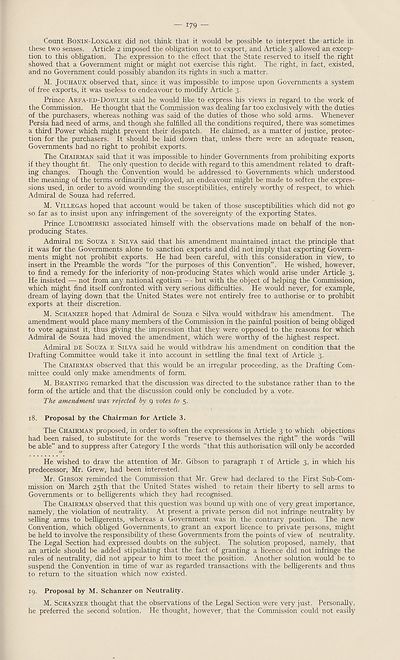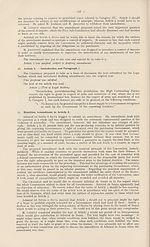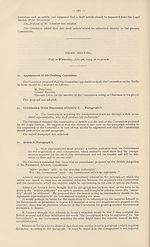Armament > Conference for the control of the international trade in arms, munitions and implements of war
(181)
Download files
Complete book:
Individual page:
Thumbnail gallery: Grid view | List view

179
Count Bonin-Longare did not think that it would be possible to interpret the article in
these two senses. Article 2 imposed the obligation not to export, and Article 3 allowed an excep¬
tion to this obligation. The expression to the effect that the State reserved to itself the right
showed that a Government might or might not exercise this right. The right, in fact, existed,
and no Government could possibly abandon its rights in such a matter.
M. Jouhaux observed that, since it was impossible to impose upon Governments a system
of free exports, it was useless to endeavour to modify Article 3.
Prince Arfa-ed-Dowleh said he would like to express his views in regard to the work of
the Commission. He thought that the Commission was dealing far too exclusively with the duties
of the purchasers, whereas nothing was said of the duties of those who sold arms. Whenever
Persia had need of arms, and though she fulfilled all the conditions required, there was sometimes
a third Power which might prevent their despatch. He claimed, as a matter of justice, protec¬
tion for the purchasers. It should be laid down that, unless there were an adequate reason,
Governments had no right to prohibit exports.
The Chairman said that it was impossible to hinder Governments from prohibiting exports
if they thought fit. The only question to decide with regard to this amendment related to draft¬
ing changes. Though the Convention would be addressed to Governments which understood
the meaning of the terms ordinarily employed, an endeavour might be made to soften the expres¬
sions used, in order to avoid wounding the susceptibilities, entirely worthy of respect, to which
Admiral de Souza had referred.
M. Villegas hoped that account would be taken of those susceptibilities which did not go
so far as to insist upon any infringement of the sovereignty of the exporting States.
Prince Lubomirski associated himself with the observations made on behalf of the non¬
producing States.
Admiral de Souza e Silva said that his amendment maintained intact the principle that
it was for the Governments alone to sanction exports and did not imply that exporting Govern¬
ments might not prohibit exports. He had been careful, with this consideration in view, to
insert in the Preamble the words “for the purposes of this Convention”. He wished, however,
to find a remedy for the inferiority of non-producing States which would arise under Article 3.
He insisted — not from any national egotism — - but with the object of helping the Commission,
which might find itself confronted with very serious difficulties. He would never, for example,
dream of laying down that the United States were not entirely free to authorise or to prohibit
exports at their discretion.
M. Schanzer hoped that Admiral de Souza e Silva would withdraw his amendment. The
amendment would place many members of the Commission in the painful position of being obliged
to vote against it, thus giving the impression that they were opposed to the reasons for which
Admiral de Souza had moved the amendment, which were worthy of the highest respect.
Admiral de Souza e Silva said he would withdraw his amendment on condition that the
Drafting Committee would take it into account in settling the final text of Article 3.
The Chairman observed that this would be an irregular proceeding, as the Drafting Com¬
mittee could only make amendments of form.
M. Branting remarked that the discussion was directed to the substance rather than to the
form of the article and that the discussion could only be concluded by a vote.
The amendment was rejected by 9 votes to 5.
18. Proposal by the Chairman for Article 3.
The Chairman proposed, in order to soften the expressions in Article 3 to which objections
had been raised, to substitute for the words “reserve to themselves the right” the words “will
be able” and to suppress after Category I the words “that this authorisation will only be accorded
He wished to draw the attention of Mr. Gibson to paragraph 1 of Article 3, in which his
predecessor, Mr. Grew, had been interested.
Mr. Gibson reminded the Commission that Mr. Grew had declared to the First Sub-Com¬
mission on March 25th that the United States wished to retain their liberty to sell arms to
Governments or to belligerents which they had recognised.
The Chairman observed that this question was bound up with one of very great importance,
namely, the violation of neutrality. At present a private person did not infringe neutrality by
selling arms to belligerents, whereas a Government was in the contrary position. The new
Convention, which obliged Governments, to grant an export licence to private persons, might
be held to involve the responsibility of these Governments from the points of view of neutrality.
The Legal Section had expressed doubts on the subject. The solution proposed, namely, that
an article should be added stipulating that the fact of granting a licence did not infringe the
rules of neutrality, did not appear to him to meet the position. Another solution would be to
suspend the Convention in time of war as regarded transactions with the belligerents and thus
to return to the situation which now existed.
19. Proposal by M. Schanzer on Neutrality.
M. Schanzer thought that the observations of the Legal Section were very just. Personally,
he preferred the second solution. He thought, however, that the Commission could not easily
Count Bonin-Longare did not think that it would be possible to interpret the article in
these two senses. Article 2 imposed the obligation not to export, and Article 3 allowed an excep¬
tion to this obligation. The expression to the effect that the State reserved to itself the right
showed that a Government might or might not exercise this right. The right, in fact, existed,
and no Government could possibly abandon its rights in such a matter.
M. Jouhaux observed that, since it was impossible to impose upon Governments a system
of free exports, it was useless to endeavour to modify Article 3.
Prince Arfa-ed-Dowleh said he would like to express his views in regard to the work of
the Commission. He thought that the Commission was dealing far too exclusively with the duties
of the purchasers, whereas nothing was said of the duties of those who sold arms. Whenever
Persia had need of arms, and though she fulfilled all the conditions required, there was sometimes
a third Power which might prevent their despatch. He claimed, as a matter of justice, protec¬
tion for the purchasers. It should be laid down that, unless there were an adequate reason,
Governments had no right to prohibit exports.
The Chairman said that it was impossible to hinder Governments from prohibiting exports
if they thought fit. The only question to decide with regard to this amendment related to draft¬
ing changes. Though the Convention would be addressed to Governments which understood
the meaning of the terms ordinarily employed, an endeavour might be made to soften the expres¬
sions used, in order to avoid wounding the susceptibilities, entirely worthy of respect, to which
Admiral de Souza had referred.
M. Villegas hoped that account would be taken of those susceptibilities which did not go
so far as to insist upon any infringement of the sovereignty of the exporting States.
Prince Lubomirski associated himself with the observations made on behalf of the non¬
producing States.
Admiral de Souza e Silva said that his amendment maintained intact the principle that
it was for the Governments alone to sanction exports and did not imply that exporting Govern¬
ments might not prohibit exports. He had been careful, with this consideration in view, to
insert in the Preamble the words “for the purposes of this Convention”. He wished, however,
to find a remedy for the inferiority of non-producing States which would arise under Article 3.
He insisted — not from any national egotism — - but with the object of helping the Commission,
which might find itself confronted with very serious difficulties. He would never, for example,
dream of laying down that the United States were not entirely free to authorise or to prohibit
exports at their discretion.
M. Schanzer hoped that Admiral de Souza e Silva would withdraw his amendment. The
amendment would place many members of the Commission in the painful position of being obliged
to vote against it, thus giving the impression that they were opposed to the reasons for which
Admiral de Souza had moved the amendment, which were worthy of the highest respect.
Admiral de Souza e Silva said he would withdraw his amendment on condition that the
Drafting Committee would take it into account in settling the final text of Article 3.
The Chairman observed that this would be an irregular proceeding, as the Drafting Com¬
mittee could only make amendments of form.
M. Branting remarked that the discussion was directed to the substance rather than to the
form of the article and that the discussion could only be concluded by a vote.
The amendment was rejected by 9 votes to 5.
18. Proposal by the Chairman for Article 3.
The Chairman proposed, in order to soften the expressions in Article 3 to which objections
had been raised, to substitute for the words “reserve to themselves the right” the words “will
be able” and to suppress after Category I the words “that this authorisation will only be accorded
He wished to draw the attention of Mr. Gibson to paragraph 1 of Article 3, in which his
predecessor, Mr. Grew, had been interested.
Mr. Gibson reminded the Commission that Mr. Grew had declared to the First Sub-Com¬
mission on March 25th that the United States wished to retain their liberty to sell arms to
Governments or to belligerents which they had recognised.
The Chairman observed that this question was bound up with one of very great importance,
namely, the violation of neutrality. At present a private person did not infringe neutrality by
selling arms to belligerents, whereas a Government was in the contrary position. The new
Convention, which obliged Governments, to grant an export licence to private persons, might
be held to involve the responsibility of these Governments from the points of view of neutrality.
The Legal Section had expressed doubts on the subject. The solution proposed, namely, that
an article should be added stipulating that the fact of granting a licence did not infringe the
rules of neutrality, did not appear to him to meet the position. Another solution would be to
suspend the Convention in time of war as regarded transactions with the belligerents and thus
to return to the situation which now existed.
19. Proposal by M. Schanzer on Neutrality.
M. Schanzer thought that the observations of the Legal Section were very just. Personally,
he preferred the second solution. He thought, however, that the Commission could not easily
Set display mode to:
![]() Universal Viewer |
Universal Viewer | ![]() Mirador |
Large image | Transcription
Mirador |
Large image | Transcription
Images and transcriptions on this page, including medium image downloads, may be used under the Creative Commons Attribution 4.0 International Licence unless otherwise stated. ![]()
| League of Nations > Armament > Conference for the control of the international trade in arms, munitions and implements of war > (181) |
|---|
| Permanent URL | https://digital.nls.uk/195384116 |
|---|
| Shelfmark | LN.IX |
|---|
| Description | Over 1,200 documents from the non-political organs of the League of Nations that dealt with health, disarmament, economic and financial matters for the duration of the League (1919-1945). Also online are statistical bulletins, essential facts, and an overview of the League by the first Secretary General, Sir Eric Drummond. These items are part of the Official Publications collection at the National Library of Scotland. |
|---|---|
| Additional NLS resources: |
|

